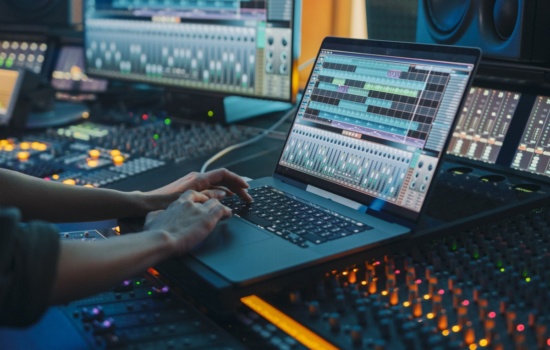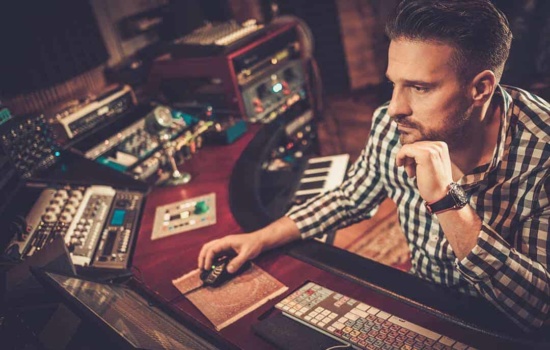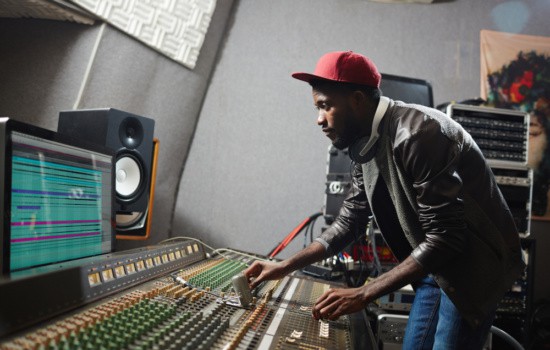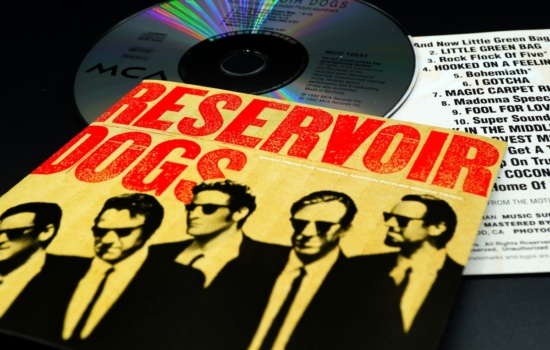Music Career Finder
Start Here:
Music Editor
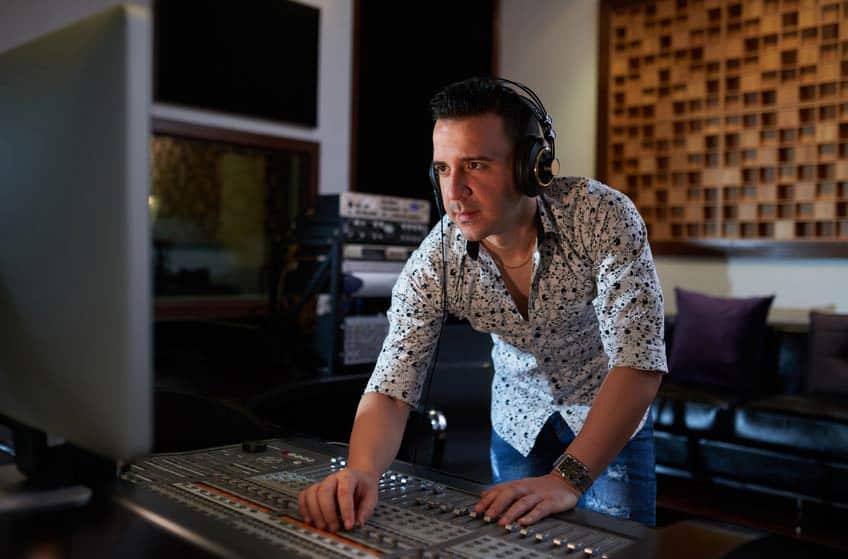
How To Become a Music Editor
- A music editor mixes, edits, and synchronizes music to films, TV shows, and advertisements
- The music editor is the liaison between the director and the composer
- You may end up working 60-80 hours a week
- Some traveling is involved
- You have to be musical and also knowledgable about the film industry
- The average salary for a music editor is $71,382 per year and ranges from $59,000 to $111,000
- Career Description
- Salary
- Career Outlook
- Career Path
- Experience & Skills
- Education & Training
- Additional Resources
- Sources
- References
Career Description
A music editor mixes, edits, and synchronizes music to visual media, like a film, TV show, or advertisement.
What Does a Music Editor Do?
The music editor is in charge of syncing music to a piece of visual media.
Chris Brooks, a Los Angeles-based Music Editor who has worked with Martin Scorcese and Rob Reiner, said a music editor is a liaison betwen the film team and the composer(s).
The film team includes the director, film editor, assistant editor, and producers. And there’s usually only one composer to work with, although that’s not always the case.
Here are the main things a music editor does:
- Create temp tracks (temporary music to help shape scenes until the composer writes new music)
- Coordinate playback of music on set
- Attend “spotting sessions” where the whole team discusses what/how music will be used in the project
- Take “spotting notes” to share with the composer
- Pass along feedback notes from the director to the composer
- Bookkeeping and document organization
Salary
The average yearly salary for a music editor is approximately $71,382 per year and ranges from $59,000 to $111,0001.
How Do Music Editor’s Make Money?
Brooks said production editors and directors hire music editors directly.
“It’s definitely a union rate and there are a lot of contractual rules about how we’re paid,” he said.
“We’re paid a weekly rate and that’s spelled out in the contract. There’s no such thing as a daily rate or a flat rate for music editors, not officially. Most are paid above scale, although probably not the ones that are just starting out.”
Hey, what do you think about trying our new Music Career HelperMusic Career Helper really quick? It’s totally free and could help get your career moving fast! Give it a try. It’s totally free and you have nothing to lose.
Career Outlook
Because music editors are usually self-employed, their working hours may not always be like a regular 9-to-5.
Brooks said the hours you work could “runs the gamut.”
“There are certainly a lot of nights and weekends, working 60, 70 or 80 hour weeks,” he said.
“I’ve worked through the holidays and all that. It depends on the project. Some projects and some people are like that, but others are like [9-to-6].”
Brooks has done a lot of traveling in his career, mainly because he works with a composer who lives in London and he’s in New York.
“I don’t know anyone who doesn’t do a modicum of traveling,” he said.
As for the actual work, he said sometimes you’re on a project that you hate. So you just have to remember, it will be over soon.
On the flip side, you don’t want the really good projects to end because you’re having so much fun.
“…If you’re on a really wonderful project it’s going to end and that’s sad because the people are so great,” he said. “I do Rob Reiner’s films and they’re so fun; the people are wonderful and you don’t want it to end. When you work with the good people you don’t want to go back to the creeps.”
Career Path
The usual trajectory for aspiring music editors, according to Brooks, is to:
- Graduate from a music or film music program
- Move to a city with a strong music and film scene (like New York or Los Angeles)
- Seek out assistantships/apprenticeships/internships
Feature Films
Once a music editor has been working in the field for a while, the most money and prestige comes from working on feature films.
“I suppose the pinnacle…is doing big feature films for the studios,” Brooks said.
Like many aspiring music editors, Brooks moved to LA after college to find work in the film industry.
He made notes of who was on the TV shows and films he watched. He kept a list of who the music editors were, then he would contact them.
“I called all of them and made appointments to go see them and see if I could get in as an assistant or apprentice,” he said.
TV Shows
Brooks said there are many opportunities in the TV world. So many TV shows are happening and so many new ones are being created.
“Television is always a good place to start because there’s a lot of work and a lot of people who need music editors,” he said. “The great thing is that it’s constant; you’re doing a show every week and you end up getting a lot of experience. At the same time, it’s probably not as high pressure as doing a big feature film.”
Experience & Skills
To succeed as a music editor, you need much more than just music editing skills…
Music Editing
Music editing skills are obviously required, so you need to know the ins and outs of your chosen digital audio workstation (DAW) and other editing software.
It would also be great to be somewhat musical.
“…A music background is probably more important than film because those things can be learned,” Brooks said. “Even the software and all that. We use all those tools, but it’s only a portion of our job. Pro Tools editors are not Music Editors.”
Learn About Film
You also need to learn as much as you can about the film world.
“…Learn as much about filmmaking as possible because that’s the language one needs to communicate with filmmakers,” Brooks said. “They understand how to communicate dramatically but not musically.”
Have a Musical Skill
Brooks said it’s definitely better if you have a musical background or are musical in some way.
“I have known a few who didn’t have a music background, but most do who are any good,” he said.
Be Easy To Work With
Brooks joked that the right kind of personality to work in music editing is “someone who knows how to keep their mouth shut.”
It’s also important, he added, to be “someone who’s humble, easygoing, and has the ability to fit in without having to always be the focus of attention.”
Make Connections (Friends)
You definitely need people skills to succeed as a music editor.
Be authentic. Make friends. Work with people you like and be someone who others want to work with.
“Relationships. It’s all about relationships,” Brooks said. “Also, how do you define success? That’s how I define success. Life’s too short to work with assholes.”
Education & Training
No formal education is required, but because you’ll need to learn to be musical and to use music- and video-editing software, a music degree could benefit you.
Music Editor Degree
Brooks advises you to get a degree from a music school or a film school and major in music production or music composition.
Additional Resources
Music Editors are part of the Motion Picture Editors Guild.
“You have to be in that union to do union work, and most of the work is union,” Brooks said. “Some also belong to the musicians’ union.”
Sources

Christopher Brooks
Christopher Brooks is a Los Angeles-based Music Editor and the author of the book Music for Filmmakers: Understanding the Impact of Music in Film. Over the course of his impressive career he has worked on over a hundred TV shows and films, including classic films like Goodfellas, X-men, Mr. Holland’s Opus, Pleasantville, Batman Forever, Robin Hood: Prince of Thieves, and the Lethal Weapon and Die Hard series. Recent credits include Showtime’s Escape at Dannemora and Amazon’s The Boys.
He teaches film scoring at USC. As a Music Editor, he has been featured in Esquire, Scoring Sessions, BMI, and the Berklee College of Music blog.
References
- 1Multiple. "Music Editor Salaries in United States". Glassdoor. published: June 6, 2024. retrieved on: Nov 18, 2024
